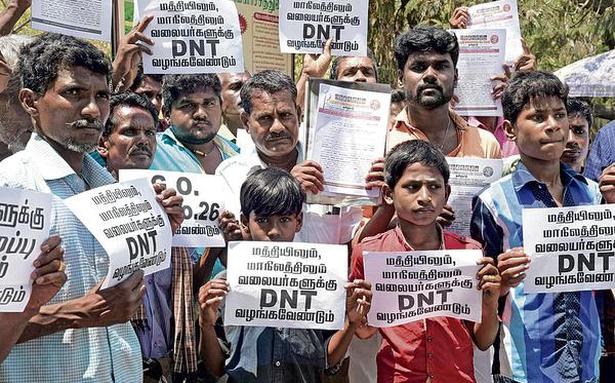A protest in Tamil Nadu demanding community certificates as Denotified Tribes. | Photo Credit: M. Govarthan
The Union Social Justice Ministry has so far received 402 (as of 8 p.m. on August 29) online applications from across the country to avail benefits under SEED, a scheme meant for the upliftment of Denotified, Nomadic and Semi-Nomadic Tribes (DNTs/NTs/SNTs).
More than 10 crore Indians from 1,400 communities belong to these groups, as per the latest estimates available with the government. However, none of the applications received so far on SEED’s online portal have been approved yet, with multiple officials explaining that the exercise to bring all DNT, NT and SNT communities under SC, ST, and OBC categories is holding up the implementation of the scheme, which was unveiled in February this year by Social Justice Minister Virendra Kumar.
The Scheme for Economic Empowerment of Denotified/Nomadic/SemiNomadic (SEED) communities was launched earlier this year with the aim to provide free competitive exam coaching to these students, to provide health insurance to families, to uplift clusters of these communities through livelihood initiatives, and to provide financial assistance for housing. The Ministry has been allocated ₹200 crore for this scheme – to be spent over five years from FY 2021-2022 to FY 2025-2026.
At the time of the launch, the Ministry had announced that the scheme will be implemented through an online portal that will issue a unique ID to each applicant so they can apply and track the status of their application online. Of the applications received on the portal so far, 17 are for free coaching, 111 are for health insurance, 222 are for housing, and 52 are for livelihood assistance, the Ministry said.
The Development and Welfare Board for De-notified, Nomadic and Semi-Nomadic Communities (DWBDNC) has not yet begun sifting through the applications as they are still being reviewed at the State and district levels, officials said. One of them added, “Once this is done, the board will look at the applications to see which ones can be approved.”
But multiple officials involved in the implementation of the scheme said what is holding up the process is the accurate categorisation of DNTs/NTs/SNTs under the list of Scheduled Castes, Scheduled Tribes and Other Backward Classes.
The DWBDNC is working with the list of DNTs/NTs/SNTs enumerated by the commission led by Bhiku Ramji Idate, which listed 1,262 such communities and categorised them under SC/ST or OBC and others. Other than this, the commission in its report dated January 2018, had also included over 260 communities that did not fall under either SC, ST, or OBC lists.
While the Anthropological Survey of India (AnSI) and Tribal Research Institutes are studying 267 uncategorised communities to classify them under either SC, ST, or OBC, inconsistencies have been hindering the processing of SEED applications of those in the already classified 1,262 communities.
The categorisation of these communities by the Idate Commission left room for inaccuracies as outlined by the commission in their 2018 report. For instance, some communities like the Banjara people were under the SC list in Delhi, the ST list in Rajasthan and the OBC list in Uttar Pradesh. The commission also pointed out that some communities were under different lists in different districts even within the same State.
Also, different generations of the same community had been issued different community certificates, the commission noted, adding that the difference in spelling of communities based on local dialects also prevented many of them from getting a community certificate.
Sources said that State governments have been repeatedly told to issue appropriate community certificates to members of these communities so that the SEED benefits can be availed, the most recent reminder going out in June this year.
As for the categorisation exercise for the 267 communities that did not so far fall under SC, ST, or OBC lists, the AnSI has submitted reports on 24 communities to the Niti Aayog (which is monitoring the exercise). In a written reply to a Lok Sabha question this July, MoS Sushri Pratima Bhoumik said that the AnSI had finished studying 161 communities out of the 255 it is supposed to look into and it would study the remaining 70 communities throughout 2022. In addition, Tribal Research Institutes in Gujarat, Odisha, and Kerala are studying 12 other communities.
Niti Aayog officials monitoring the exercise told The Hindu, “The AnSI is expected to submit reports on all the communities by October this year.”
Government officials explained that the categorisation of DNTs/NTs/SNTs is essential for the implementation of SEED because there is no schedule in the Constitution providing for their reservation. “So, we are asking State governments to uniformly categorise these communities under SC, ST, or OBC lists and then provide a sub-categorisation in their certificates, declaring them as either DNT, NT, or SNT,” one official said.
The Idate Commission in its report had first recommended that a separate schedule be created for these communities so that they can avail benefits meant for them. In case this was not possible, the commission had recommended sub-categorisation of DNTs/NTs/SNTs under the existing schedules for SC, ST, and OBC communities so they are not crowded out by relatively better-placed communities. 
Our code of editorial values
Printable version | Aug 29, 2022 11:26:58 pm | https://www.thehindu.com/news/cities/Delhi/denotified-nomadic-semi-nomadic-tribes-402-seed-registrations-so-far-online-none-approved-yet/article65827103.ece
© THG PUBLISHING PVT LTD.






